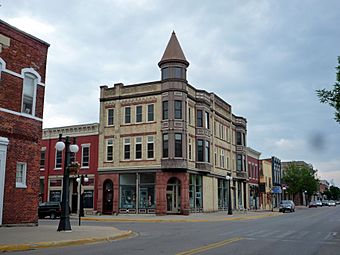First Street Historic District facts for kids
|
First Street Historic District
|
|
 |
|
| Location | Roughly bounded by N side of 10th Ave., 4th Ave., 2nd St., and Green Bay Shoreline, Menominee, Michigan |
|---|---|
| Area | 29 acres (12 ha) |
| Built | 1880 |
| Architectural style | Beaux-Arts, Romanesque Revival, Vernacular architecture |
| NRHP reference No. | 74000997 |
Quick facts for kids Significant dates |
|
| Added to NRHP | December 31, 1974 |
The First Street Historic District is a special area in Menominee, Michigan. It's also called the Main Street Historic District. This historic area has more than 40 old buildings. It covers about 29 acres (12 ha) of land.
This district is found near the Green Bay shoreline. It stretches from Fourth Avenue to the north side of Tenth Avenue and Second Street. People in Menominee often call this area the Historic Waterfront Downtown. It was added to the National Register of Historic Places in 1974. It also became a Michigan State Historic Site in the same year.
Contents
History of First Street District
How Menominee Grew
In the mid-1800s, Menominee was a busy place. Its spot on Lake Michigan helped both shipping and lumber industries. The area had many forests, which was great for cutting timber.
Building the Downtown Area
Starting in the 1850s, wealthy people in Menominee began building. They put up commercial buildings along First Street. Local architects designed these buildings. They used materials that were easy to find nearby.
New Industries and Designs
By the early 1900s, mining became important. This brought new business leaders to Menominee. They hired architects from Chicago to create grand public buildings. These new buildings added to the district's unique look.
Why This District is Important
The First Street Historic District is special. It shows us what a busy downtown looked like in the late 1800s. Many of its buildings are still in great shape today.
What You'll See in the District
Buildings and Their Styles
The First Street Historic District has over 40 buildings. Most of these are commercial buildings. There are also some civic buildings and a few private homes. Many were built around 1890, when Menominee was growing fast.
Local Materials and Designs
Many commercial buildings here have a common Midwestern design. They are often built with local red sandstone. Some buildings show a style called Romanesque Revival. These are made from bricks produced right in Menominee.
Fancy Facades
You'll also see buildings with fancy fronts. Some have a classical look. Others show the Beaux-Arts style. Many of these buildings look much like they did when they were first built. Only small changes have been made over time.



